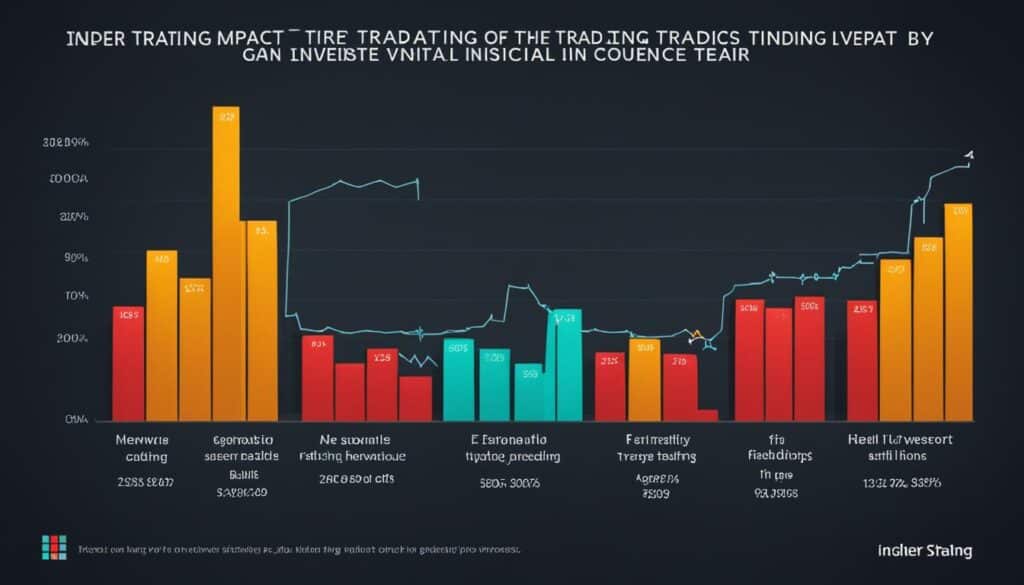Gaining a deep understanding of insider trading is essential for anyone looking to navigate the complex landscape of the stock market. As a journalist and copywriting expert, I have analyzed the intricacies of insider trading and its impact on both investors and regulatory practices. In this article, I will delve into the subject, providing you with a comprehensive overview of insider trading and its implications.
Key Takeaways:
- Insider trading involves the buying or selling of securities based on non-public material information.
- There are legal and illegal forms of insider trading.
- Illegal insider trading undermines market integrity and investor confidence.
- Regulatory bodies, such as the SEC, have implemented measures to combat insider trading.
- Famous cases, like Martha Stewart and Raj Rajaratnam, highlight the consequences of insider trading.
What is Insider Trading?
Insider trading refers to the buying or selling of securities by individuals with access to non-public material information about the company. It is a practice that can significantly impact the stock market and investor confidence. In this section, we will explore the definition of insider trading and the different types involved.
Definition of Insider Trading
Insider trading is the act of trading securities based on material non-public information. Material information refers to any information about a company that could potentially influence the stock price if known to the public. Non-public information can include financial results, pending acquisitions, legal issues, or any other undisclosed facts that could impact investor decisions.
Types of Insider Trading
There are two main types of insider trading: legal and illegal.
- Legal Insider Trading: This type of insider trading involves corporate insiders, such as executives or directors, trading company stock based on information that has been disclosed to the public. For example, if an executive purchases company stock based on positive earnings results that have been announced, it is considered legal insider trading.
- Illegal Insider Trading: In contrast, illegal insider trading occurs when individuals trade based on material non-public information. This type of trading is prohibited by securities laws as it provides an unfair advantage to those who have access to confidential information. Illegal insider trading can lead to market manipulation, unfair competition, and a loss of investor trust. It is a violation of the Securities Exchange Act of 1934.
By understanding the definition and types of insider trading, we can delve deeper into its implications on investors and the stock market as a whole.
Impact of Insider Trading on Investors
Insider trading can have significant ramifications for investors. When insiders trade based on material non-public information, it creates an unfair advantage, undermining market integrity and investor confidence.
“Insider trading gives certain individuals an unfair advantage, making it difficult for other investors to compete on a level playing field.”
Other investors who are not privy to the same information may suffer financial losses as a result of trading against insiders. This can erode trust in the market and deter individuals from participating, leading to a decline in overall investor confidence.
Investors rely on a fair and transparent market to make informed decisions. When insider trading occurs, it shakes the foundation of trust upon which the stock market is built. This erosion of trust can have a long-lasting impact, as it may take time for investors to regain confidence in the market.
Moreover, investor confidence plays a crucial role in the stability and growth of the stock market. When investors lack confidence, they may withdraw their investments or refrain from participating altogether. This can disrupt market liquidity and hinder capital formation, impeding economic growth.
Regulatory Practices and Measures Against Insider Trading
To effectively address the issue of insider trading, regulatory bodies such as the Securities and Exchange Commission (SEC) play a crucial role in implementing stringent regulations and enforcement actions. These measures aim to ensure a fair and transparent stock market for all participants.
Insider Trading Regulations
The SEC has established comprehensive insider trading regulations to combat illegal trading activities. These regulations require insiders, including corporate executives, directors, and significant shareholders, to disclose their trades publicly within a specified time frame. By making this information readily available to the public, these regulations increase transparency and help prevent unfair advantages in the market.
Furthermore, the SEC prohibits insiders from trading based on material non-public information. This restriction applies to any information that would significantly impact the stock price if made public. By preventing individuals from exploiting confidential information, insider trading regulations aim to maintain a level playing field for all market participants.
Enforcement Actions
The SEC actively investigates and prosecutes cases of insider trading. Through rigorous enforcement actions, the SEC aims to deter individuals from engaging in illegal trading activities and preserve the integrity of the stock market.
When individuals are found guilty of insider trading, the SEC imposes penalties, fines, and sanctions as part of their enforcement actions. These actions serve as a deterrent and send a clear message that insider trading will not be tolerated. By imposing significant consequences, the SEC aims to protect investor trust and confidence in the stock market.
“Insider trading undermines the fair and efficient functioning of the stock market. Through strong regulatory practices and effective enforcement actions, we can deter illegal activities and promote a level playing field for all market participants.” – SEC Chairman
| Regulatory Measures | Impact |
|---|---|
| Public Disclosure Requirements | Increased transparency and accountability |
| Prohibition of Trading on Material Non-Public Information | Prevention of unfair advantages and market manipulation |
| Investigations and Prosecutions | Deterrence and preservation of market integrity |
| Penalties, Fines, and Sanctions | Consequences for illegal trading activities |
The combination of robust insider trading regulations and stringent enforcement actions by the SEC serves as a powerful deterrent against illegal trading practices. These measures promote investor confidence and maintain the integrity of the stock market, ensuring a level playing field for all participants.
Notable Cases of Insider Trading
Over the years, there have been several famous insider trading cases that have captured public attention. These high-profile cases serve as reminders of the serious consequences and legal ramifications individuals face when engaging in illegal insider trading.
Martha Stewart
One notable example is the case of Martha Stewart, a well-known businesswoman and television personality. In 2004, Stewart was convicted for her involvement in an insider trading scandal related to shares of ImClone Systems. Stewart sold her ImClone stock after receiving material non-public information about the company’s failed drug trial. She was found guilty of obstruction of justice and making false statements to federal investigators. As a result, Stewart served a prison sentence and faced financial penalties.
Raj Rajaratnam
Another significant insider trading case involved Raj Rajaratnam, a co-founder of Galleon Group, a prominent hedge fund. In 2011, Rajaratnam was found guilty of multiple counts of securities fraud and conspiracy to commit insider trading. The case, which involved confidential information obtained from company insiders and industry contacts, sent shockwaves through the financial world. Rajaratnam was sentenced to 11 years in prison, making it one of the longest prison terms ever handed down for insider trading offenses.
These cases, along with many others, demonstrate the gravity of insider trading and the commitment of regulatory bodies and law enforcement agencies to maintain fair and transparent financial markets. By punishing those who engage in illegal insider trading, authorities seek to protect the integrity of the stock market and safeguard the interests of investors.
| Case | Individual | Conviction | Sentence |
|---|---|---|---|
| Martha Stewart | Martha Stewart | Obstruction of justice, making false statements | Prison sentence, financial penalties |
| Raj Rajaratnam | Raj Rajaratnam | Securities fraud, conspiracy to commit insider trading | 11 years in prison |
Analyzing the Economic Impact of Insider Trading
Insider trading can have a detrimental impact on market efficiency and overall economic stability. By allowing insiders to profit unfairly from non-public information, the market becomes less transparent and efficient. This can lead to distortions in stock prices and misallocation of resources.
Additionally, insider trading can undermine investor confidence and deter participation in the market, affecting capital formation and economic growth. When investors witness insider trading, it erodes trust in the fairness of the market and raises concerns about unfair advantages. This skepticism can discourage individuals from investing, potentially hampering the flow of capital and hindering economic development.
Insider trading not only distorts the market’s natural price discovery mechanism but also poses a risk to the stability and confidence of investors. It creates an atmosphere of unfairness and unequal opportunities, which can hinder the smooth functioning of the economy.
Market efficiency is a key component of a healthy financial system. It ensures that prices accurately reflect all available information and that investors can make informed decisions based on fair and equal access to that information. Insiders trading on non-public material information disrupts this equilibrium, leading to a less efficient market where prices may no longer reflect true value.
| Economic Consequences of Insider Trading |
|---|
| Distortions in stock prices |
| Misallocation of resources |
| Decrease in investor confidence |
| Deterrence of market participation |
| Disruption of capital formation |
| Hindered economic growth |
Insider trading not only undermines market integrity but also poses risks to the overall economy. It is essential for regulators and law enforcement agencies to enforce strict regulations and take decisive actions against illegal insider trading. By promoting transparency, fairness, and trust, the financial markets can foster an environment conducive to economic growth and prosperity.
Conclusion
In summary, the analysis of insider trading is crucial for understanding its impact on investors and regulatory practices in the stock market. By examining the complexities of this issue, we can develop a comprehensive understanding of the implications involved.
Enforcing strict regulations and penalties is essential to deter illegal insider trading and maintain market integrity. The Securities and Exchange Commission (SEC) plays a vital role in investigating and prosecuting cases of insider trading, imposing fines and sanctions on those found guilty of engaging in such activities. These measures act as a deterrent and help ensure fairness and transparency in the market.
Continual monitoring and addressing instances of insider trading are necessary to promote fairness, transparency, and investor trust. By doing so, the stock market can maintain its integrity, mitigate the economic consequences of insider trading, and foster a supportive environment for investors.
FAQ
What is insider trading?
Insider trading refers to the buying or selling of securities by individuals with access to non-public material information about the company.
What are the types of insider trading?
There are two main types of insider trading: legal and illegal. Legal insider trading occurs when corporate insiders trade company stock based on information that has been disclosed to the public. Illegal insider trading involves trading based on material non-public information, which is prohibited by securities laws.
What is the impact of insider trading on investors?
Insider trading can have significant ramifications for investors. It creates an unfair advantage, undermining market integrity and investor confidence. Non-insiders may suffer financial losses as a result of trading against insiders, leading to a decline in overall investor confidence.
What regulatory practices are in place to combat insider trading?
Regulatory bodies such as the Securities and Exchange Commission (SEC) require insiders to disclose their trades publicly and impose strict penalties for illegal trading activities. The SEC actively investigates and prosecutes cases of insider trading, levying fines and sanctions against guilty individuals.
Can you provide some notable cases of insider trading?
One notable case is Martha Stewart, who was convicted for selling shares after receiving material non-public information about a failed drug trial. Another significant case involved Raj Rajaratnam, a hedge fund manager, who was found guilty of insider trading and received one of the longest prison sentences in history for such offenses.
What is the economic impact of insider trading?
Insider trading can have a detrimental impact on market efficiency and overall economic stability. It leads to less transparent and efficient markets, distortions in stock prices, and misallocation of resources. It also undermines investor confidence and deters participation, affecting capital formation and economic growth.
Source Links
- https://finance.yahoo.com/news/victory-square-portfolio-company-xr-173000533.html
- https://finance.yahoo.com/news/global-molecular-imaging-industry-projected-173000524.html
- https://finance.yahoo.com/news/aerospheres-mytechnic-form-strategic-consignment-172800541.html
Disclaimer
All information on this website is of a general nature. The information is not adapted to conditions that are specific to your person or entity. The information provided can not be considered as personal, professional or legal advice or investment advice to the user.
This website and all information is intended for educational purposes only and does not give financial advice. Signal Mastermind Signals is not a service to provide legal and financial advice; any information provided here is only the personal opinion of the author (not advice or financial advice in any sense, and in the sense of any act, ordinance or law of any country) and must not be used for financial activities. Signal Mastermind Signals does not offer, operate or provide financial, brokerage, commercial or investment services and is not a financial advisor. Rather, Signal Mastermind Signals is an educational site and a platform for exchanging Forex information. Whenever information is disclosed, whether express or implied, about profit or revenue, it is not a guarantee. No method or trading system ensures that it will generate a profit, so always remember that trade can lead to a loss. Trading responsibility, whether resulting in profits or losses, is yours and you must agree not to hold Signal Mastermind Signals or other information providers that are responsible in any way whatsoever. The use of the system means that the user accepts Disclaimer and Terms of Use.
Signal Mastermind Signals is not represented as a registered investment consultant or brokerage dealer nor offers to buy or sell any of the financial instruments mentioned in the service offered.
While Signal Mastermind Signals believes that the content provided is accurate, there are no explicit or implied warranties of accuracy. The information provided is believed to be reliable; Signal Mastermind Signals does not guarantee the accuracy or completeness of the information provided. Third parties refer to Signal Mastermind Signals to provide technology and information if a third party fails, and then there is a risk that the information may be delayed or not delivered at all.
All information and comments contained on this website, including but not limited to, opinions, analyzes, news, prices, research, and general, do not constitute investment advice or an invitation to buy or sell any type of instrument. Signal Mastermind Signals assumes no responsibility for any loss or damage that may result, directly or indirectly, from the use or dependence on such information.
All information contained on this web site is a personal opinion or belief of the author. None of these data is a recommendation or financial advice in any sense, also within the meaning of any commercial act or law. Writers, publishers and affiliates of Signal Mastermind Signals are not responsible for your trading in any way.
The information and opinions contained in the site are provided for information only and for educational reasons, should never be considered as direct or indirect advice to open a trading account and / or invest money in Forex trading with any Forex company . Signal Mastermind Signals assumes no responsibility for any decisions taken by the user to create a merchant account with any of the brokers listed on this website. Anyone who decides to set up a trading account or use the services, free of charge or paid, to any of the Broker companies mentioned on this website, bears full responsibility for their actions.
Any institution that offers a service and is listed on this website, including forex brokers, financial companies and other institutions, is present only for informational purposes. All ratings, ratings, banners, reviews, or other information found for any of the above-mentioned institutions are provided in a strictly objective manner and according to the best possible reflection of the materials on the official website of the company.
Forex/CFD trading is potentially high risk and may not be suitable for all investors. The high level of leverage can work both for and against traders. Before each Forex/CFD investment, you should carefully consider your goals, past experience and risk level. The opinions and data contained on this site should not be considered as suggestions or advice for the sale or purchase of currency or other instruments. Past results do not show or guarantee future results.
Neither Signal Mastermind Signals nor its affiliates ensure the accuracy of the content provided on this Site. You explicitly agree that viewing, visiting or using this website is at your own risk.




